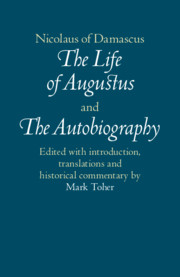 Nicolaus of Damascus: The Life of Augustus and The Autobiography
Nicolaus of Damascus: The Life of Augustus and The Autobiography Published online by Cambridge University Press: 11 May 2017
I LIFE AND CAREER OF NICOLAUS
Thanks to excerpts that survive from N.'s autobiography (IB) and Josephus’ accounts of his career at the court of Herod the Great, a great deal more is known about N. than about the vast majority of ancient writers. The autobiography offers significant information about N.'s lineage, education, opinions and self-representation, while Josephus in his Antiquitates Judaicae presents a substantial account of N.'s career in Jerusalem in the last decade of Herod's reign. It is a collection of evidence that provides insight into how N.'s relationships with Herod and Augustus developed; why certain themes are prominent in the Bios; and how N. came to have such a dispassionate view of the assassins and their plot against Caesar while at the same time giving full approval to Octavian's ambition to attain Caesar's power.
(i) Lineage, Education and Career to 14 bc
According to his autobiography (IB 1.1–3), N. was the son of a member of the governing and social elite of Damascus. His father Antipater had held all local offices in the city, he was an accomplished orator and highly respected for his talent as an emissary to neighboring states. The family's piety toward the Greek gods, their names (although names are no guarantee of ethnic origin) and all other evidence concerning the family of N. suggest that if they were not Greek by ethnicity, they certainly were intellectually and culturally, as most likely was their social milieu in Damascus. But this passage on the lineage of N. constitutes some of our earliest evidence for the social character of Damascus, and so it is difficult to say much more than what it offers about the cultural context in which N. spent his youth.
N. was born ca. 64 bc, since he says that he was around sixty years old when he journeyed to Rome after the death of Herod in 4 bc (IB 6.8), and the autobiography (IB 2) provides a fulsome description of his education and devotion to the philosophy of Aristotle. Although claims of precocious intellectual development seem to have been a trope in ancient autobiography and encomiastic biography, N.'s comments on his education and teaching are significant.
To save this book to your Kindle, first ensure [email protected] is added to your Approved Personal Document E-mail List under your Personal Document Settings on the Manage Your Content and Devices page of your Amazon account. Then enter the ‘name’ part of your Kindle email address below. Find out more about saving to your Kindle.
Note you can select to save to either the @free.kindle.com or @kindle.com variations. ‘@free.kindle.com’ emails are free but can only be saved to your device when it is connected to wi-fi. ‘@kindle.com’ emails can be delivered even when you are not connected to wi-fi, but note that service fees apply.
Find out more about the Kindle Personal Document Service.
To save content items to your account, please confirm that you agree to abide by our usage policies. If this is the first time you use this feature, you will be asked to authorise Cambridge Core to connect with your account. Find out more about saving content to Dropbox.
To save content items to your account, please confirm that you agree to abide by our usage policies. If this is the first time you use this feature, you will be asked to authorise Cambridge Core to connect with your account. Find out more about saving content to Google Drive.